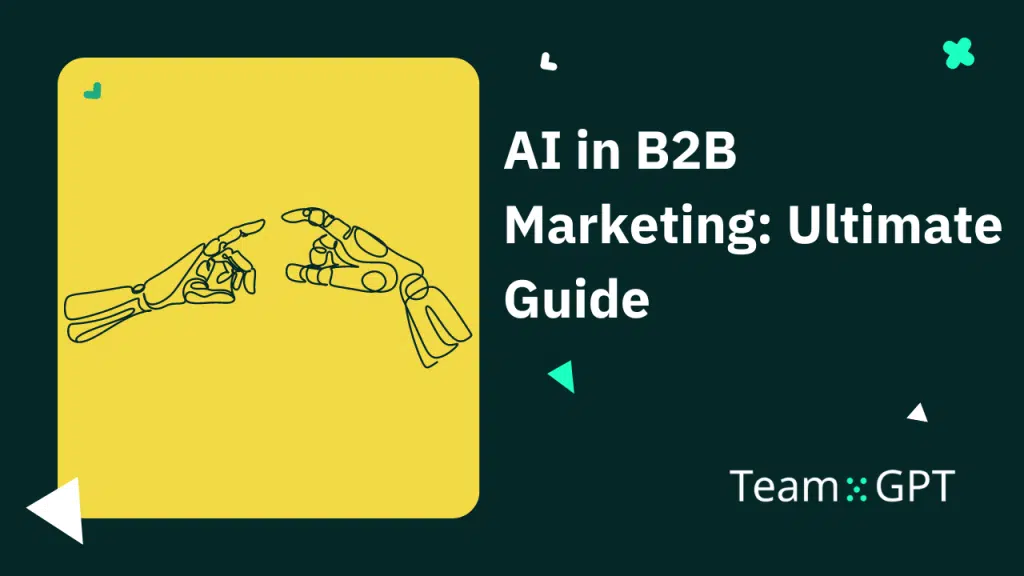In 2025, AI in B2B marketing continues to be an indispensable tool, transforming how businesses engage with their audience to boost sales and conversion rates.
With the use of machine learning and algorithms, companies can seamlessly automate and optimize their marketing strategy while improving their marketing activities.
The aim of AI in B2B marketing is to redefine how these businesses interact with their prospects and clients thereby reducing cost, saving time, and also driving growth. This article explores use cases of Artificial Intelligence in B2B marketing from marketing automation to customer segmentation and predictive analytics for future trends.
Without further ado, let’s take a dive into AI-driven marketing,
What Are the Key Benefits of AI in B2B Marketing?
While many people are aware of marketing automation as one of AI’s profound impacts on B2B marketing, AI has more benefits in B2B marketing. For instance, AI improves personalization and data analysis.
Similarly, the use of AI chatbots helps to enhance customer support, eliminating repetitive tasks and improving customer shopping experience. Below are the benefits of AI in B2B marketing.
Improved Data Analysis and Actionable Insights from Customer Data
When it comes to uncovering trends and insights, there is usually a vast amount of data to sift through. Interestingly, this is where AI-powered data analysis comes in. It enables businesses to save time sorting data as AI is known to analyze big data in a shorter time compared to humans.
With the use of machine learning algorithms to identify patterns and predict customer behavior, marketing organizations can make better decisions based on the results of the analyzed data. This was highlighted by Muhammad Ishtiaq Khan, “With generative AI, businesses can analyze data in real-time, providing instant, actionable insights that drive better decisions.”
Enhanced Lead Scoring and Segmentation through AI Algorithms
AI lead scoring uses machine learning to track and evaluate customer data when they interact with businesses. It involves ranking prospects or leads based on their conversion likelihood which helps the marketing team to focus on promising leads. When ranking leads, they are assigned based on their interaction with the organization, demographics and behavior.
In the same vein, customer segmentation in B2B marketing comes close to lead scoring. Typically, AI customer segmentation involves the use of AI to divide a large target audience into smaller groups making them easy to manage. AI algorithms for customer segmentation also help businesses connect better with their audience. The data you get from segmenting your customer helps in creating effective marketing strategies which in turn improves customer experience, satisfaction and loyalty.
Automation of Marketing Campaigns (Email, Social Media, Content)
While it’s common for people to use AI and automation interchangeably, the latter uses technology but with human input. On the other hand, AI performs tasks on behalf of humans often involving problem-solving and reasoning. The combination of AI and automation especially in B2B marketing is explosive making marketing campaign creation a breeze.
For instance, businesses can personalize emails for customers based on their preferences. The automated emails can contain recommended products based on the buyers’ purchase history. Similarly, the use of AI in email marketing contributes to customer retention by optimizing loyalty emails based on customers’ buying behavior.
What are the Top Use Cases for AI in B2B Marketing?
One thing is common for all B2B marketers, they’re looking for ways to increase their ROI. And isn’t that the purpose of being in business?
Among other things, B2B marketers have used AI to streamline their content creation to meet the unique needs of their audience. To get the highest ROI, they have used different generative AI tools.
Below are the top seven use cases of AI in B2B marketing.
1. AI for Automated Report and Proposal Creation
Let’s face it, writing business reports can be a hard nut to crack, especially if they’re complex. They require several proofreading to ensure they are perfect making them daunting and time-consuming. Thankfully, AI came to change the narrative.
It’s no longer new to find many organizations embracing automation to reduce cost and improve efficiency while also streamlining business processes. B2B marketers have used different generative AI tools to automate the creation of complex business reports, and proposals. This way, there’s a huge reduction in human labor and the sales team can concentrate on strategy and customer interactions.
For B2B marketers who hate to stare at blank pages and would rather proofread and edit a proposal than write it from scratch, AI is a great idea. Or maybe what you want is fresh ideas to include in your proposal, then AI tools can be a great writing buddy for you.
Organizations that want productivity and precision know the best way to go is AI. Pitching to your next big client doesn’t have to wear down the marketing team and take the whole day. With the right prompt, your document is ready.
B2B marketers have used AI for the following:
● Generate rough drafts for cover letters
● Rewrite a public template proposal to suit their specific style or a particular client
● Get ideas to include in their proposal
● Generate titles for their proposal sections
Here’s how you can write a business proposal in 3 minutes with AI using Team-GPT:
2. AI for Sales Script Generation
Traditionally, sales prospecting required a huge amount of human effort, particularly when it came to cold calling and virtual selling. It was common to find sales teams often dedicating large chunks of their day to researching prospects, drafting personalized scripts, and conducting outreach. Not only was this process daunting and time-consuming especially when they were dealing with long lists of prospects, but the pressure to be timely and efficient often led to rushed, inconsistent messaging.
However, AI revolutionalized and completely transformed the narrative. Professionals have discovered the power of AI in generating sales scripts. Within seconds, you can develop a professional sales script using the right prompt, ensuring more consistent, targeted communication.
One of the most notable breakthroughs in this area is the use of generative AI for creating sales scripts. Rather than spending hours crafting the perfect pitch, businesses can now generate high-quality, professional sales scripts within seconds. All that is required is to simply input a well-crafted prompt. This automation allows sales reps to quickly go around between prospects without sacrificing the personalization and quality that successful sales conversations require.
Content isn’t left out of this automation process using AI. Content generation tools like ChatGPT can help you create target-specific marketing emails and responses that sound human. You can utilize AI to create your brand’s promotional copies, email subject lines, etc.
The same goes for social media campaigns. You can use AI to automate your social media campaigns, helping you cut costs by hiring an expert or even taking too long to develop a campaign. With a simple prompt on AI tools, your social media marketing campaign will be ready to execute in no time.
Furthermore, after generating your scripts, you can narrate them with human voices with the use of AI. AI voice technology for scripts can improve your organization’s digital communication. With this technology, you can have more inclusive content, automate your responses and even translate them.
3. Conversational AI to Boost Conversions
Conversational AI is fast becoming the most popular technology among businesses. Interestingly, more and more businesses are using it in different ways to improve their conversions. Businesses used to rely heavily on human call center agents to handle customer interactions across their multiple channels. While this was effective in building personal relationships among the business and clients, it was expensive, limited in scale and time-consuming. Human agents could only handle one conversation at a time which often led to delays in responding to clients, long wait times and missed conversion opportunities.
According to B2B Techfluencer, Evan Kirstel, “The era of AI is reshaping the contact center, making agents’ roles more consultative as technology handles repetitive tasks”. Conversational AI tools can independently hold conversations across different channels simultaneously (from web assistance to emails, TikTok and Instagram DMs to Facebook and WhatsApp messages). This helps businesses reduce the expenses associated with more conventional forms of communication that need the involvement of a human agent, such as phone calls and also increases conversions and revenues.
While some companies use conversational AI to cater to the needs of their customers in a better way, others use it to manage their teams. Conversational AI assists businesses in gathering and evaluating data to give them an upper hand and help in making critical decisions.
Additionally, conversational AI helps these businesses understand their customers better. Retailers can recommend products to customers based on their interactions with the brand by using conversational AI tools.
4. AI for Automated Content Generation
In the world of marketing, content is king. Great content is one of the things that attract prospective customers to businesses. From writer’s block to insufficient time and rigid posts, in the past, creating written content was a hassle. Whether it’s blog posts, social media posts, case studies, product descriptions, or white papers, B2B marketers use generative AI tools to produce consistent contents that engage prospects and drives lead generation.
Companies can use AI to generate weekly blog posts that address common challenges most businesses in their industry face, explain product benefits, and share company news. By doing this, they significantly increase their content output and SEO performance.
While generative AI can help with amazing content, it’s equally essential to ensure that the content doesn’t lack human touch. This is because clients are human and they appreciate it better when they can relate to content from a human perspective.
Here’s how you can write articles in about 3 minutes inside of Team-GPT alongside your team:
5. The Use of Behavior and Predictive Analytics to Identify and Target High-quality Leads
Every serious business is constantly looking for better ways to increase the value they get from analytics, and this is one of the best uses of AI. The traditional method of analyzing data was prone to error as the data was often too large and too complex to navigate. In the end, they would spend a large sum of money hiring several data analysts to get the job done
Interestingly, generative AI helps businesses provide insights into consumer behavior, preferences, and future trends by analyzing large volumes of the company’s data in a short time. To get the best of generative AI, businesses input quality data including, social engagement, website analytics, campaign performance, and event analytics. The process of analyzing customer data using AI is seamless, helping you to discover what motivates your customers as well as who they are.
In the same vein, generative AI models can predict which prospects are likely to convert and help sales teams focus their energy on these prospects. The result helps create data-driven marketing strategies, make the right investment, and get better results. Aside from predicting prospects, Gen AI can also accurately predict products that will be in demand in the future ahead of its competitors.
In addition, AI-powered data analysis can be a useful tool in helping organizations stay ahead of their competition. It helps businesses track how much other organizations charge for their services, the marketing channels they use and if they are preferred by the audience.
6. Use of AI Chatbots for Initial Lead Qualification and Nurturing
One of the biggest challenges businesses face is capturing and nurturing leads. Many organizations switched over to AI from traditional methods because of their inability to provide immediate responses that are tailored to potential customers.
Thanks to automated tools like AI chatbots that help to gather customers’ contact information and efficiently qualify leads, business owners can now effectively engage website visitors in real-time and as a result, boost conversion rates. AI chatbots can help companies answer questions relating to their business within seconds without customers suspecting a thing. This way, their team can focus on other important things.
In many B2B organizations, AI chatbots have become a staple. In some cases, AI chatbots can set follow-up meetings, answer questions, and even suggest products that fit the customer’s needs perfectly based on their past interests. What this means for customers is a seamless experience from inquiry to purchase. While on the other hand, AI chatbots ensure that businesses are always accessible. The result is more engagement and more sales.
Similarly, AI chatbots have also helped B2B marketers in scheduling appointments for prospective clients. This enhances customer experience which is highly essential in ensuring that first-time customers return. Whether on social media or website pages, AI chatbots ensure that no question goes unanswered irrespective of the time it was asked. They capture leads even when social media managers are not available.
For instance, if a company is hosting a webinar, AI chatbots can help make the process easier, more interactive, and more engaging by simplifying event registrations. When someone shows interest in the event, the chatbot pops up with an offer to help them register. It also guides them through a simplified registration process, asking for their name, email, and any other important details. AI chatbots can equally send reminders as the event date approaches in a way that’s both conversational and user-friendly.
7. Real-time Data Processing to Optimize Lead Generation Strategies
Lead generation is the foundation of every business and in today’s world, businesses are always looking for new and creative methods to optimize lead generation strategies. In the past, one sure way of getting new leads was cold calling, sending random emails and even going to networking events.
Although these methods worked at some point, they were slow and couldn’t keep up with the changing times. What this meant was businesses missing out on good opportunities and not reaching the right audience. Thanks to AI in B2B marketing, they can now improve the quality and number of leads.
AI can also help to send personalized email campaigns at the right time by analyzing customer data and previous interactions. AI tools understand the preferences and behaviors of different segments of your audience and can tailor email content, timing, and frequency to maximize engagement and conversion rates.
Leveraging AI-driven engagement has also helped marketers to nurture and maintain leads. AI-driven engagement tools help to maintain continuous interaction with leads throughout the buying journey. They analyze engagement patterns and preferences and deliver customized content and communications to enhance lead nurturing efforts.
Conclusion
There’s no doubt that the future is AI and companies looking to thrive in today’s world must incorporate AI in their activities. For organizations in the marketing space, AI is essential as it streamlines and simplifies operations.
For example, one of the common use cases of AI in B2B marketing is the generation of automated email marketing content. Not only does it aid in cutting down costs, but it also adds a personalized touch which improves client retention. Similarly, predictive analysis is another benefit of AI in B2B marketing as it provides insights into consumer behavior, preferences, and future trends, putting businesses ahead in their industry.
By leveraging AI tools and techniques, organizations can optimize their marketing strategy, personalize marketing campaigns and gain valuable insights. As AI continues evolving, it offers even more opportunities for businesses to thrive.



